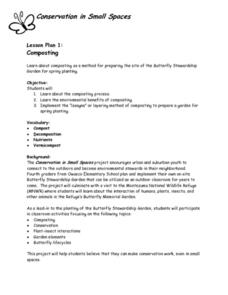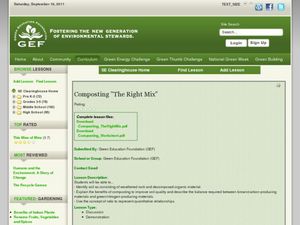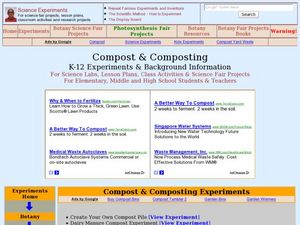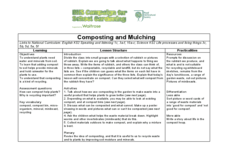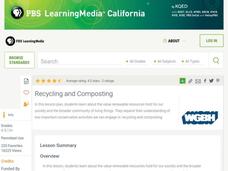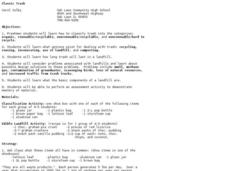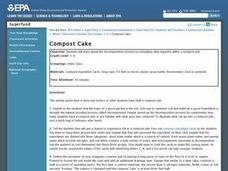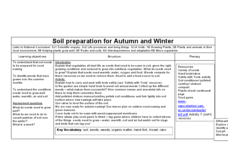Curated OER
Life, Death, Dirt, & Walt Whitman
Walt Whitman was a composter? Certainly the cycle of life and death he describes in "Leaves of Grass" parallels the processes going on in a compose pile. The interdisciplinary approach detailed here could be used to foster a deeper...
Curated OER
A Design You’ll Dig: Designing a Habitat for Worms
Young scholars discover how worms contribute to the balance of the environment. In this composting lesson, students study the composting and decomposition processes. Young scholars then create habitats for worms that allow them to do...
Curated OER
Conservation in Small Places - Composting
A fabulous instructional activity introduces the art of composting to your gardeners. In it, youngsters learn about the composting process and how it actually works. They discuss the environmental benefits of composting, and use the...
Curated OER
Nutrients Nutrients We Need
Second graders examine the six nutrients humans need to maintain good heath. In this ecosystem lesson, 2nd graders learn about how plants grow and compare how humans need nutrients from plants to how plants need nutrients from the soil....
Curated OER
Recycling and Composting
Students set up composting sites that allow food scraps and paper to be recycled by nature. They are introduced to one aspect of recycling; composting. Students see how God recycles as the worms change garbage into something that brings...
Curated OER
Composting "The Right Mix"
Learners investigate the correct mix of material types for compost. In this composting instructional activity, students explore the correct amounts of different types of materials to create a compost heap. Learners then create a compost...
Curated OER
Biotechnology
A continuous cascade of information comes through this PowerPoint on biotechnology. The topic is defined, a history is presented, and basic genetic engineering techniques are explained. The topic is covered in an objective manner,...
Curated OER
Composting With Worms
Third graders predict what happen in two (control and experiment) containers -- one with soil and trash, the other with soil, trash, and worms.
Curated OER
Organic Matter
Written for an agriculture curriculum, this presentation on organic matter is also informative for gardening or horticulture classes. It details the chemical makeup, affecting factors, functions, maintenance, and composting to create a...
Curated OER
Composting
Using 2-liter bottles, junior ecologists create composting tubes in which they place nitrogen-rich and carbon-rich materials. They observe what changes occur over two weeks' time. Provide more specific direction to your class as to what...
Curated OER
To Rot or Not!
Learners discover that composting helps reduce landfill waste and is good for the soil. They explore the techniques of composting through a variety of media, art activities and hands-on experience.
Curated OER
Organic Farming / Agriculture
Want an organic farming resource packed with experiments, background information, science fair projects, and topics of interest for further research? Here it is. Young environmental scientists can explore concepts involved in organic...
Curated OER
Nature's Recycling Program
Students identify what materials make up compost. For this science of recycling lesson, students explain the benefits of composting determine how compost is a good plant fertilizer.
Curated OER
Compost and Composting Experiments
Students investigate the composting process through a variety of experiments. In this ecology activity, students discuss the benefits of composting. They examine how compost affect plant growth.
Curated OER
Composting and Mulching
Second graders define composting and recognize what can be composted. In this composting and mulching lesson, 2nd graders classify objects or pictures as good or bad for composting. Students write a story about life in the compost heap.
Curated OER
Recycling and Composting
Students investigate the reasons for and processes of Recycling and Composting. In this environmental lesson, students learn to identify renewable and nonrenewable resources and then practice recycling by making recycled paper and...
Curated OER
Worms! Nature's Recyclers
Third graders explore the process of composting. In this composting lesson, 3rd graders read the book Wonderful Worms, and create composters.
Curated OER
Classic Trash
Students investigate how trash is classified and the options to deal with it. In this trash and recycling instructional activity, students perform an activity to classify trash into organic, renewable/ recyclable, now...
Curated OER
Composting Conundrum
Students research cafeteria composting. In this composting lesson plan, students design a vessel that would allow the cafeteria staff to collect food scraps for composting. Then students build a prototype and present it to the class....
Curated OER
Talkin' Trash (All About Landfills)
Students investigate the types of waste created by people and identify various options for trash disposal. They read and discuss a handout about what a landfill is and the different types of trash, match types of trash with the proper...
Curated OER
Composting
Students survey what composting is. They observe the benefits of composting over the course of the school year by making your own composters and gardens. Group members compare two different compost piles, make conclusions about...
Curated OER
Compost Cake
Students examine the decomposition process. They create their own class compost pile and record their observations. They discover which materials decompose at a different rate.
Curated OER
Soil Preparation for Autumn and Winter
Students determine how and why soil needs to be prepared for the fall and winter seasons. In this agriculture lesson, students determine how to use gardening tools safely. They show how to work with compost material and fertilizer to...
Curated OER
Composting in Schools: Observing Compost Microorganisms
Students explore composting. In this composting lesson, students use compound microscopes to observe the microbial communities in compost. Observations and documentation of changes will occur over the course of several weeks.




